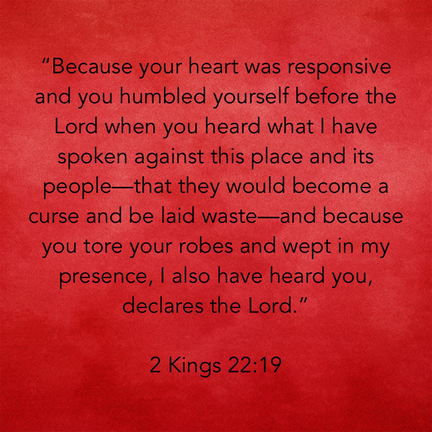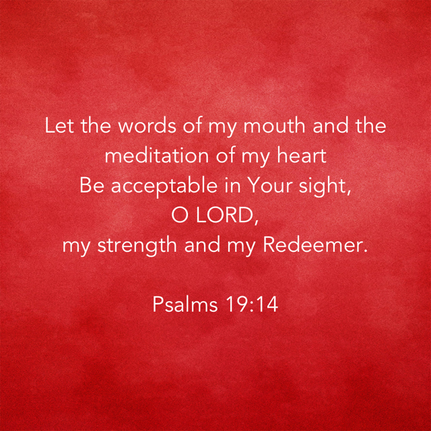|
Good morning!
We're so happy you've joined us today!
When we meet together in person, we share our joys and concerns with each other before we focus on our Sunday school lesson. Think about your needs and concerns right now, and if you like, you can share them in the comments.
The lesson for today is about King Josiah, who ruled Judah when a lost book of the Bible was rediscovered. Reading it, he was horrified to learn of God’s displeasure and anger because of his people's idolatry. Josiah repented on behalf of himself and his people. Reading and studying the Bible is important because, among other benefits, it enables us to understand the seriousness of sin and God’s willingness to forgive those who sincerely repent. The prayer below may serve to guide us in our opening prayer. It is from the blog Katy and the Word by Katy Stenga.
Lord we are thankful whenever we can see your grace dripping down to earth. We are grateful when we can right the wrongs, turn to another path, and encourage one another. Help us to recognize your fire as it burns in our hearts today and every day we pray. Amen.
This week's lesson is on 2 Kings 22:14-20.
Introduction The Information Age we live in is a double-edged sword: there is a massive amount of useful information available, but there are also massive amounts of factual errors and bias. Which customer review is the reliable guide to booking a hotel room or trying a new restaurant? Which news network should you count on as being the most trustworthy? To what commentators and analysts do you turn to make unbiased sense of current events? What source of information can be trusted above all others? In the lesson text for this week, we encounter a young king who faced similar questions. After may centuries, his decision is still instructive. Lesson context The events took place in the days of Josiah, king of Judah, who reigned from 640 to 609 BC. He was a godly king and was known for his tireless attempts to purify Judah’s worship and the temple. If you read 2 Kings, you will find a succession of kings who vacillated between those who pleased God and those who “did evil in the eyes of the Lord,” with most falling into the latter category. For example, Josiah’s great-grandfather Hezekiah instituted a set of religious reforms that were designed to restore proper worship of God. However, after his death, his son, Manasseh rebuilt the pagan worship shines his father had destroyed and even went so far as to offer his son in child sacrifice and build pagan altars inside the temple. Late in his reign Manasseh repented, but his earlier evil contributed to Judah’s ultimate destruction and exile. Josiah’s father, Amon, returned to the idolatry that characterized Manasseh’s earlier reign, but he was assassinated after only having a two-year reign and, at only 8 years old, Josiah became king. In our lesson for today, we read the names of some of the godly advisors who apparently influenced Josiah. When Josiah was 16, he began to seek God, and in the twelfth year of his reign, when he was 20, he started to purge the land of pagan idols and shrines. About six years later, he ordered the renovation of the temple. It was during this renovation that the Book of the Law was discovered inside the temple. Scholars debate whether this book refers to the Pentateuch, the first five books of the Bible, or only to the book of Deuteronomy. At some point during the reigns of Manasseh and Amon, the book had disappeared. Perhaps it had been lost or forgotten or perhaps idolatrous priests had intentionally “misplaced” it. The scribe Shaphan reported to Josiah about the progress of the renovations, and he also informed him about the discovery of the book. Josiah reacted with distress, likely when he saw how it detailed Israel’s punishment if if failed to keep the covenant. The curses culminated in the people’s exile from the land God had given them. In response to Judah’s guilt, Josiah commissioned a delegation to inquire of the Lord concerning the wrath that Josiah feared God would soon visit on him and his kingdom. Our lesson opens with a description of that delegation. I. A Word Sought: Verse 14 The delegation includes Shaphan, who was mentioned above; Hilkiah, who is not only a priest but the high priest; Ahikam, a son of Shaphan; Akbor, an official in Josiah’s court whose son was to become an official in the court of King Jehoiakim, Josiah’s son; and Asaiah, designated as “the king’s attendant. These leaders went to speak to the prophet Huldah. Jewish tradition holds that she and Jehoiada the priest were buried in Jerusalem, an honor reserved for those of King David’s family. Female prophets are less common than male prophets, but there are several other women who served as prophets in Old Testament times, among them Miriam, Moses’s elder sister; Deborah, a judge of Israel; and the unnamed wife of the prophet Isaiah. II. A Word for Jerusalem: Verses 15-17 “This is what the Lord, the God of Israel, says,” Huldah begins her oracle, repeating the phrase a second time for emphasis and to reinforce the fact that the following words are not hers but God’s. Then she affirms Josiah’s greatest fear, that God would indeed bring disaster upon Judah and Jerusalem. As much as King Josiah wanted to spare his nation, he could not save it from God’s coming judgment. This echoes earlier prophetic announcements against the wicked kings Jeroboam and Ahab. It also parallels an indictment that was delivered by prophets in the days of Josiah’s grandfather Manasseh (2 Kings 21:10-15) Huldah relates why God is angry and why God’s anger would not be quenched. It is because the people had made idols to other God and worshiped those idols. God’s anger was abundantly justified because it had been provoked by intentional human rebellion, the Sundays school author writes; this had happened so often that the limits of the Lord’s patience were exceeded.
III. A Word for the King: Verses 18 to 20
Now Huldah gives a word from the Lord directed specifically to King Josiah. Again, to emphasize that these words are directly from God, she says, “This is what the Lord, the God of Israel, says….” Even though Judah cannot escape God’s judgment, God recognizes Josiah’s sincere repentance and his desire to please God and return his people to God’s ways and God’s favor. When Shaphan read the law to Josiah, the king was shaken to his core. He had torn his robes to signify his grief (2 Kings 22:11). Scholars remind us that in Bible times, production of clothing was an extremely labor intensive process. Everything had to be made by hand. Cloth had to be produced from raw materials and dyed, meaning that even kings had few clothes. So tearing one’s robes intentionally would have shown the tremendous depth and sincerity of one’s grief and repentance. In this case, it was an appropriate response. The words of the scroll announced that, because of the people’s idolatry, Jerusalem would become a curse and be laid waste. Still, God had heard Josiah and had seen his weeping and the state of his heart. So God decided to honor the king’s humble and contrite response. In Leviticus 26:40-42, Moses had desired such repentance as a prerequisite for the Lord’s restoring Israel after it fell under his judgment. Such humble repentance had led God to delay the demise of Ahab’s dynasty (1 Kings 21:29), to postpone judgment in the days of Hezekiah (2 Chronicles 32:26) and to restore Josiah’s grandfather Manasseh (2 Chronicles 33:10-13). The New Testament highlights the centrality of humility and repentance before God as well. Question: What characteristic of humility should be most evident in your daily walk with Christ? A Humble Leader The Sunday school lesson author tells of a time when he and a colleague moderated a church congregational meeting concerning whether the minister should resign or be fired. They arrived to see a congregation going through a process of self-destruction. Tempers were flaring; voices were raised in anger. In the heat of the meeting, the minister declared that if he received 50.1 percent of the vote, he would stay. The author and his colleague concluded that the minister’s pride had become a key factor in the church’s troubles. They asked for a recess and talked with him privately. He acknowledged that his staying would split the church and mar its witness in the community. Reluctantly, he decided to resign. Many kings of Israel and Judah paid little heed to God’s word because they were so impressed with themselves. By contrast, Josiah was a model of humble leadership. He placed God and the welfare of his nation before himself, and God blessed him as a result. What steps can you take to humble yourself for the good of God’s people? The Lord confirmed that Josiah would be protected from the punishment coming against Judah. God promises that when Josiah died he would be buried in peace. Knowing that Josiah actually died in battle, it may seem to contradict God’s promise. But Huldah’s prophecy is not talking about the manner of Josiah’s death but the fact that, when he died, he would be at peace with God. In addition, he would not have to witness Judah’s punishment personally. The message of the prophet and the words of the book resulted in Josiah’s decision to convene the nation for a covenant renewal ceremony. He also enacted further measures to cleanse the temple and the land from elements of idolatry. Judah was spared while Josiah was alive. But after his death, Judah returned to its evil ways and experienced the promised curses: the destruction of Jerusalem and the temple at the hands of Nebuchadnezzar as well as the exile in Babylon. Conclusion The events recorded in 2 Kings 22 highlight both the importance of engaging with Gos’s words and responding to them. It seems absurd that the Book of the Law was neglected and lost to the people of Judah! Yet is that any more ridiculous than the Bible’s loss to myriads of Christians who rarely read it? We must guard against losing Scripture in our churches, our homes, and our lives. We honor God when we do God’s will as recorded in Scripture (John 14:15) Josiah sought to do just that through the reforms after the Book of the Law was found. He acted on the words he had heard from that book. He showed remorse over the sin of his people, and he sought godly insight into what he had herd read to him. Scripture study must always lead us to repentance and action based on what we encounter in its pages. This is the faithful response to learning God’s will. That process involves consulting competent interpreters of Scripture and studying it alongside other believers who are willing to hold us accountable to its words. May we, like Josiah, surround ourselves with faithful companions as we seek God’s guidance. Prayer Father, we praise you as the God of mercy and grace whose love for us has been demonstrated in mercy to Josiah and ultimately through your Son, Jesus Christ. We ask that you forgive us when we fail to heed your Word. In Jesus’ name we pray. Amen.
Benediction
Our benediction this week comes from the King James Version.
Next week's lesson will be on 1 Kings 18:5-18.
0 Comments
Leave a Reply. |
AuthorWe are a small, rural Presbyterian church in southwestern Pennsylvania. Archives
July 2024
Categories
All
|



 RSS Feed
RSS Feed